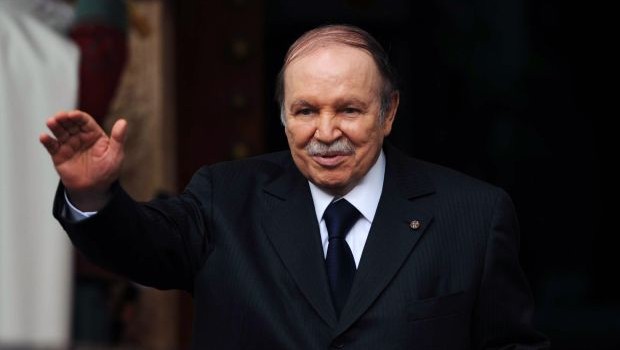
President Abdelaziz Bouteflika in Algiers on January 14, 2013. (AFP)
Algiers, Asharq Al-Awsat—Algeria’s opposition intends to put forward a “consensus candidate” to compete in next April’s presidential elections against the ruling party’s candidate, widely expected to be current President Abdelaziz Bouteflika, who will be competing for an unprecedented fourth term in office.
Naima Salhi, head of the opposition Equity and Proclamation Party, told Asharq Al-Awsat: “The group of 14 [opposition] parties that was formed following the parliamentary elections last year to denounce election rigging in favor of the ruling party has prepared a number of demands in return for competing in the presidential elections. This includes delaying amending the constitution until after the elections and withdrawing the process of organizing the elections from the interior ministry and tasking an independent body instead.”
The opposition coalition’s demands are interesting because Bouteflika cannot stand for a fourth term in office unless he first amends Algeria’s constitution. Bouteflika had been expected to step down at the end of his current term, especially after a stroke earlier this year reportedly left him partially paralyzed. However, the Algerian strongman has since carried out a surprising cabinet reshuffle, securing his grip on the state. Although the president has yet to officially state that he will run, his own National Liberation Front announced that he will seek a historic fourth term in office last month.
As for the appointment of an opposition “consensus candidate” to challenge the government, Salhi said: “We can agree on a candidate to represent us in the presidential elections. Indeed, we view it as a duty to appoint such a candidate, because the opposition cannot win a political battle against a regime that is using all the means in its hands without a strong candidate.”
“The 14-member opposition coalition believes that it will be possible to find a consensus candidate to represent us in the elections. Our numbers have increased, and the views within the group are moving closer together,” Salhi added.
Salhi refused to name any candidate who could represent the group of 14 opposition parties at next year’s elections.
The group of 14 includes a number of Islamist parties, including the Movement for the Society of Peace led by Abdel Razziq Al-Maqri, the Islamic Renaissance Movement led by Fateh Rabhi, and the Movement for National Reform led by Djahid Younsi. Younsi stood in the 2009 presidential elections but won less than 2 percent of the overall vote.
As for the possibility of standing at the next presidential elections herself, Salhi told Asharq Al-Awsat: “We are busy at the present time building the party, while we also want to facilitate things for the opposition to find a consensus candidate. If I were to run, I would only complicate the task for the opposition.”
“We are working as hard as we can to put forward a serious image of the opposition, which is primarily concerned with rescuing the country from the problems that it is facing,” Salhi added.
As for the issue of amending the constitution, Salhi said: “In our party, we believe that the constitution must not be amended each time we need to solve the problems of an individual or group of individuals within the regime.”
